Reflection Paper: Business Leadership, Marketing, and Management
VerifiedAdded on 2020/04/13
|11
|2955
|1122
Essay
AI Summary
This reflective paper delves into the intricate relationship between business leadership and marketing management. It begins by establishing the importance of leadership as a blend of art and science within organizations, emphasizing the interconnectedness of various departments like production, sales, marketing, and finance. The paper explores the evolution of marketing concepts, including production, product, selling, and marketing concepts, and how leadership plays a crucial role in their success. The author reflects on their personal biases and assumptions, particularly the shift from viewing marketing solely as advertising to understanding customer needs. The paper also discusses the importance of various leadership styles, such as autocratic, democratic, and collaborative, and their impact on marketing strategies. It also highlights the significance of technical, conceptual, and interpersonal skills for effective marketing management, while also considering the use of social media platforms for marketing. Overall, the paper underscores the need for strong leadership to drive successful marketing efforts, emphasizing the importance of understanding customer needs, adapting leadership styles, and continuously developing marketing strategies for organizational success.
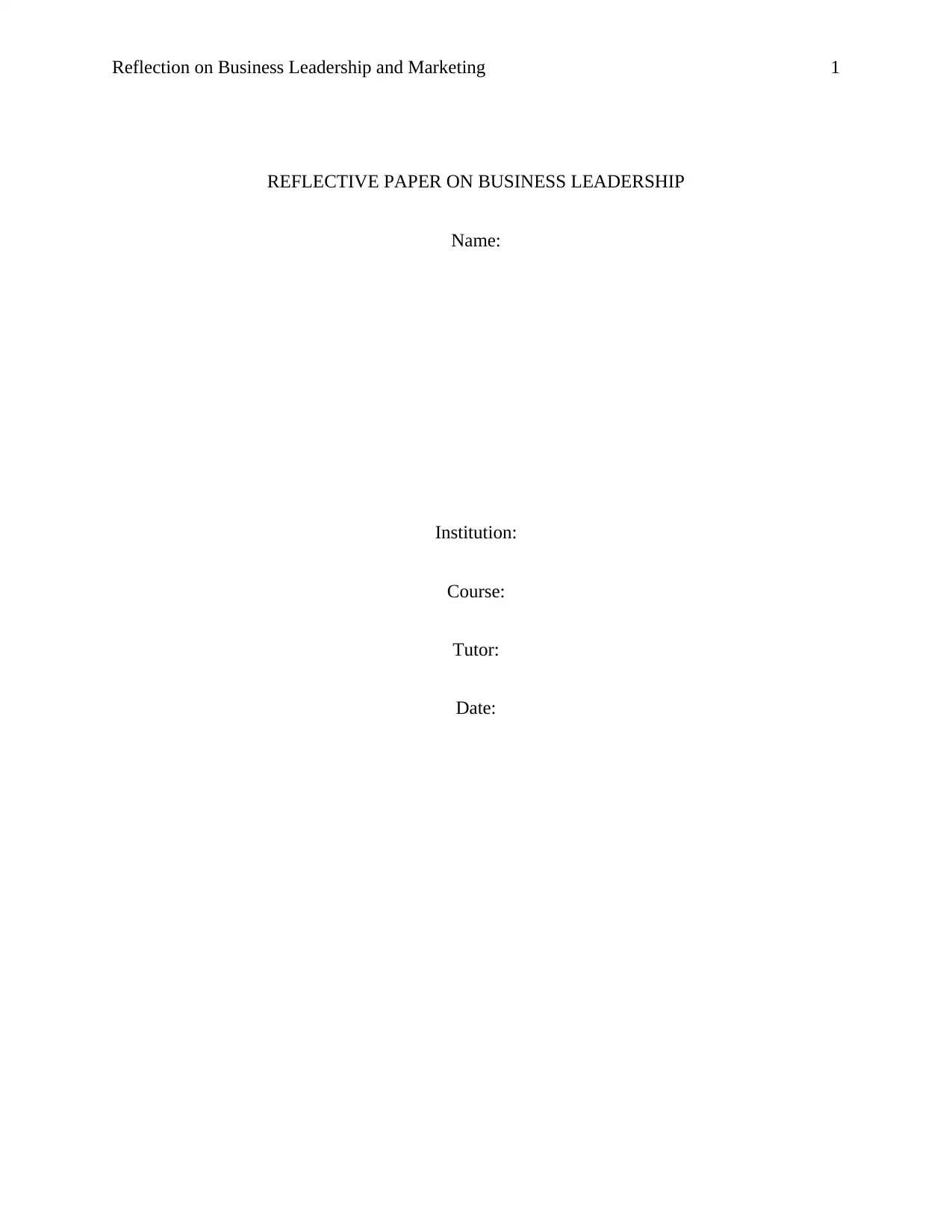
Reflection on Business Leadership and Marketing 1
REFLECTIVE PAPER ON BUSINESS LEADERSHIP
Name:
Institution:
Course:
Tutor:
Date:
REFLECTIVE PAPER ON BUSINESS LEADERSHIP
Name:
Institution:
Course:
Tutor:
Date:
Paraphrase This Document
Need a fresh take? Get an instant paraphrase of this document with our AI Paraphraser
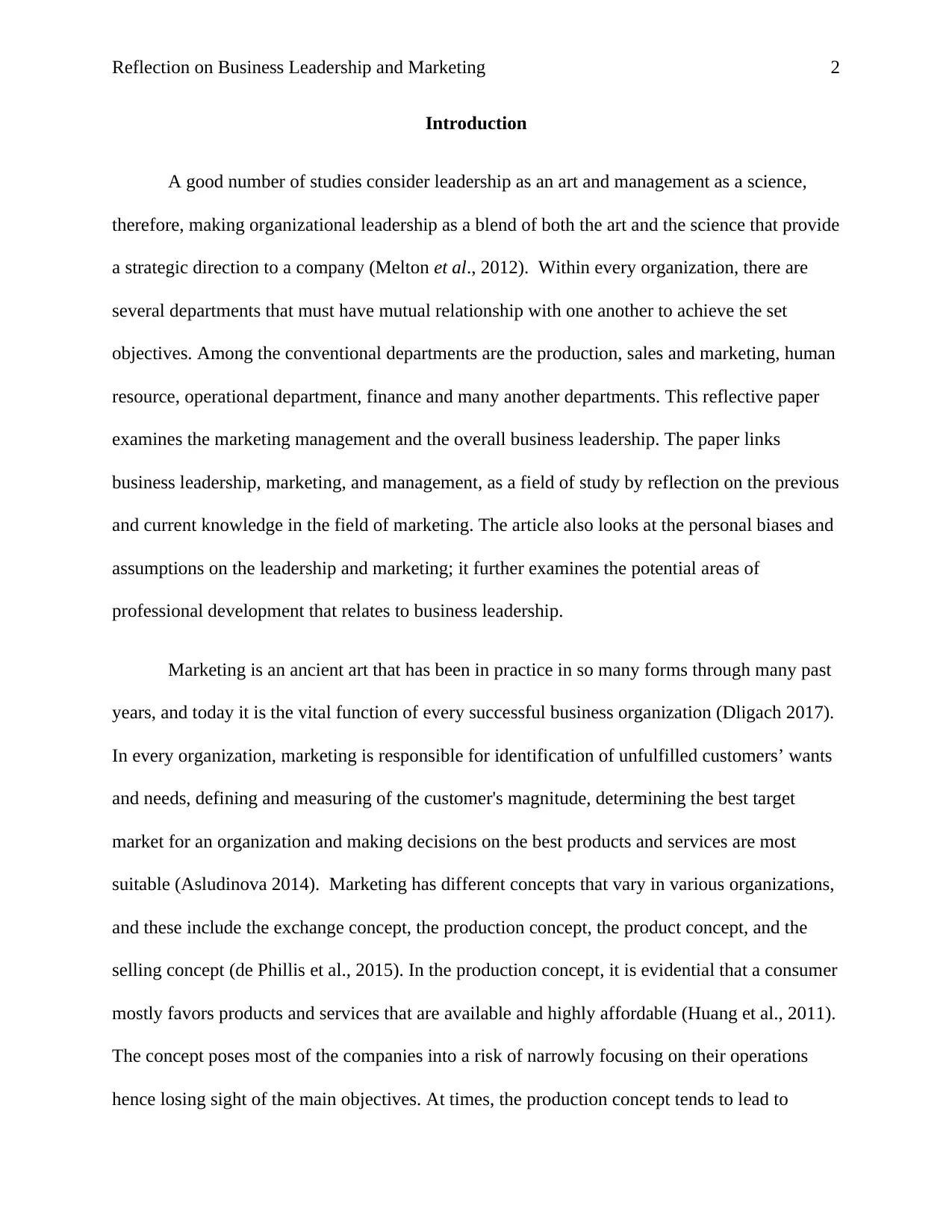
Reflection on Business Leadership and Marketing 2
Introduction
A good number of studies consider leadership as an art and management as a science,
therefore, making organizational leadership as a blend of both the art and the science that provide
a strategic direction to a company (Melton et al., 2012). Within every organization, there are
several departments that must have mutual relationship with one another to achieve the set
objectives. Among the conventional departments are the production, sales and marketing, human
resource, operational department, finance and many another departments. This reflective paper
examines the marketing management and the overall business leadership. The paper links
business leadership, marketing, and management, as a field of study by reflection on the previous
and current knowledge in the field of marketing. The article also looks at the personal biases and
assumptions on the leadership and marketing; it further examines the potential areas of
professional development that relates to business leadership.
Marketing is an ancient art that has been in practice in so many forms through many past
years, and today it is the vital function of every successful business organization (Dligach 2017).
In every organization, marketing is responsible for identification of unfulfilled customers’ wants
and needs, defining and measuring of the customer's magnitude, determining the best target
market for an organization and making decisions on the best products and services are most
suitable (Asludinova 2014). Marketing has different concepts that vary in various organizations,
and these include the exchange concept, the production concept, the product concept, and the
selling concept (de Phillis et al., 2015). In the production concept, it is evidential that a consumer
mostly favors products and services that are available and highly affordable (Huang et al., 2011).
The concept poses most of the companies into a risk of narrowly focusing on their operations
hence losing sight of the main objectives. At times, the production concept tends to lead to
Introduction
A good number of studies consider leadership as an art and management as a science,
therefore, making organizational leadership as a blend of both the art and the science that provide
a strategic direction to a company (Melton et al., 2012). Within every organization, there are
several departments that must have mutual relationship with one another to achieve the set
objectives. Among the conventional departments are the production, sales and marketing, human
resource, operational department, finance and many another departments. This reflective paper
examines the marketing management and the overall business leadership. The paper links
business leadership, marketing, and management, as a field of study by reflection on the previous
and current knowledge in the field of marketing. The article also looks at the personal biases and
assumptions on the leadership and marketing; it further examines the potential areas of
professional development that relates to business leadership.
Marketing is an ancient art that has been in practice in so many forms through many past
years, and today it is the vital function of every successful business organization (Dligach 2017).
In every organization, marketing is responsible for identification of unfulfilled customers’ wants
and needs, defining and measuring of the customer's magnitude, determining the best target
market for an organization and making decisions on the best products and services are most
suitable (Asludinova 2014). Marketing has different concepts that vary in various organizations,
and these include the exchange concept, the production concept, the product concept, and the
selling concept (de Phillis et al., 2015). In the production concept, it is evidential that a consumer
mostly favors products and services that are available and highly affordable (Huang et al., 2011).
The concept poses most of the companies into a risk of narrowly focusing on their operations
hence losing sight of the main objectives. At times, the production concept tends to lead to
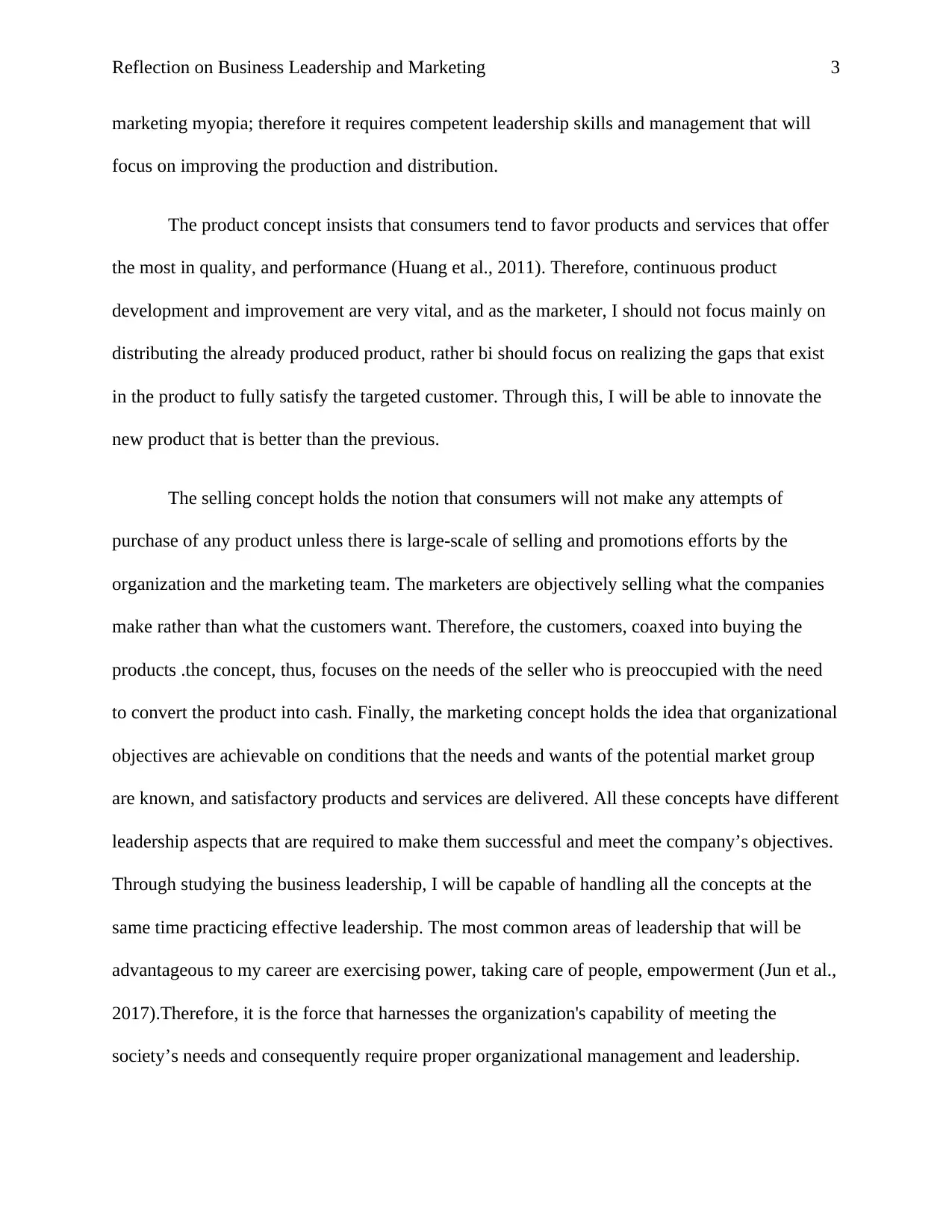
Reflection on Business Leadership and Marketing 3
marketing myopia; therefore it requires competent leadership skills and management that will
focus on improving the production and distribution.
The product concept insists that consumers tend to favor products and services that offer
the most in quality, and performance (Huang et al., 2011). Therefore, continuous product
development and improvement are very vital, and as the marketer, I should not focus mainly on
distributing the already produced product, rather bi should focus on realizing the gaps that exist
in the product to fully satisfy the targeted customer. Through this, I will be able to innovate the
new product that is better than the previous.
The selling concept holds the notion that consumers will not make any attempts of
purchase of any product unless there is large-scale of selling and promotions efforts by the
organization and the marketing team. The marketers are objectively selling what the companies
make rather than what the customers want. Therefore, the customers, coaxed into buying the
products .the concept, thus, focuses on the needs of the seller who is preoccupied with the need
to convert the product into cash. Finally, the marketing concept holds the idea that organizational
objectives are achievable on conditions that the needs and wants of the potential market group
are known, and satisfactory products and services are delivered. All these concepts have different
leadership aspects that are required to make them successful and meet the company’s objectives.
Through studying the business leadership, I will be capable of handling all the concepts at the
same time practicing effective leadership. The most common areas of leadership that will be
advantageous to my career are exercising power, taking care of people, empowerment (Jun et al.,
2017).Therefore, it is the force that harnesses the organization's capability of meeting the
society’s needs and consequently require proper organizational management and leadership.
marketing myopia; therefore it requires competent leadership skills and management that will
focus on improving the production and distribution.
The product concept insists that consumers tend to favor products and services that offer
the most in quality, and performance (Huang et al., 2011). Therefore, continuous product
development and improvement are very vital, and as the marketer, I should not focus mainly on
distributing the already produced product, rather bi should focus on realizing the gaps that exist
in the product to fully satisfy the targeted customer. Through this, I will be able to innovate the
new product that is better than the previous.
The selling concept holds the notion that consumers will not make any attempts of
purchase of any product unless there is large-scale of selling and promotions efforts by the
organization and the marketing team. The marketers are objectively selling what the companies
make rather than what the customers want. Therefore, the customers, coaxed into buying the
products .the concept, thus, focuses on the needs of the seller who is preoccupied with the need
to convert the product into cash. Finally, the marketing concept holds the idea that organizational
objectives are achievable on conditions that the needs and wants of the potential market group
are known, and satisfactory products and services are delivered. All these concepts have different
leadership aspects that are required to make them successful and meet the company’s objectives.
Through studying the business leadership, I will be capable of handling all the concepts at the
same time practicing effective leadership. The most common areas of leadership that will be
advantageous to my career are exercising power, taking care of people, empowerment (Jun et al.,
2017).Therefore, it is the force that harnesses the organization's capability of meeting the
society’s needs and consequently require proper organizational management and leadership.
⊘ This is a preview!⊘
Do you want full access?
Subscribe today to unlock all pages.

Trusted by 1+ million students worldwide
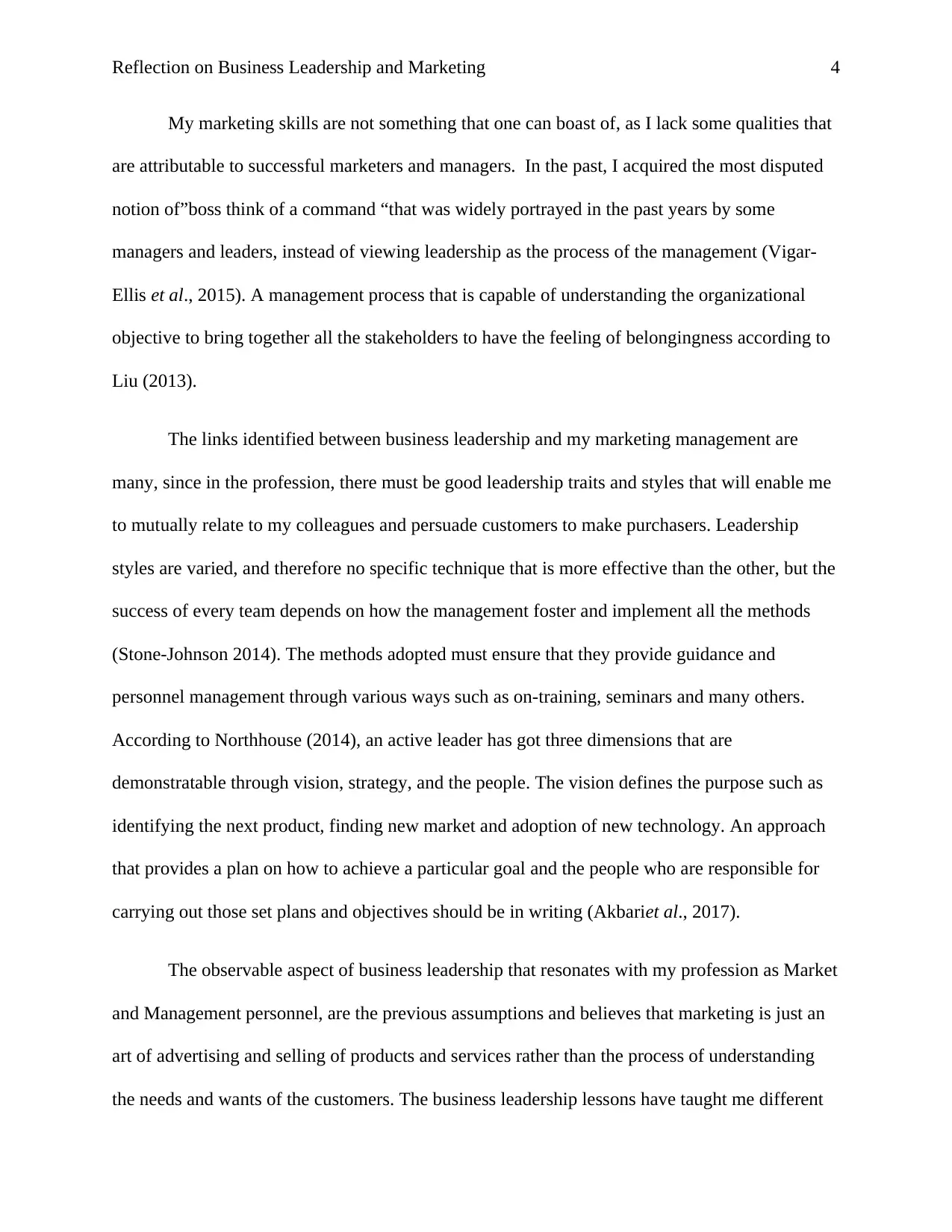
Reflection on Business Leadership and Marketing 4
My marketing skills are not something that one can boast of, as I lack some qualities that
are attributable to successful marketers and managers. In the past, I acquired the most disputed
notion of”boss think of a command “that was widely portrayed in the past years by some
managers and leaders, instead of viewing leadership as the process of the management (Vigar-
Ellis et al., 2015). A management process that is capable of understanding the organizational
objective to bring together all the stakeholders to have the feeling of belongingness according to
Liu (2013).
The links identified between business leadership and my marketing management are
many, since in the profession, there must be good leadership traits and styles that will enable me
to mutually relate to my colleagues and persuade customers to make purchasers. Leadership
styles are varied, and therefore no specific technique that is more effective than the other, but the
success of every team depends on how the management foster and implement all the methods
(Stone-Johnson 2014). The methods adopted must ensure that they provide guidance and
personnel management through various ways such as on-training, seminars and many others.
According to Northhouse (2014), an active leader has got three dimensions that are
demonstratable through vision, strategy, and the people. The vision defines the purpose such as
identifying the next product, finding new market and adoption of new technology. An approach
that provides a plan on how to achieve a particular goal and the people who are responsible for
carrying out those set plans and objectives should be in writing (Akbariet al., 2017).
The observable aspect of business leadership that resonates with my profession as Market
and Management personnel, are the previous assumptions and believes that marketing is just an
art of advertising and selling of products and services rather than the process of understanding
the needs and wants of the customers. The business leadership lessons have taught me different
My marketing skills are not something that one can boast of, as I lack some qualities that
are attributable to successful marketers and managers. In the past, I acquired the most disputed
notion of”boss think of a command “that was widely portrayed in the past years by some
managers and leaders, instead of viewing leadership as the process of the management (Vigar-
Ellis et al., 2015). A management process that is capable of understanding the organizational
objective to bring together all the stakeholders to have the feeling of belongingness according to
Liu (2013).
The links identified between business leadership and my marketing management are
many, since in the profession, there must be good leadership traits and styles that will enable me
to mutually relate to my colleagues and persuade customers to make purchasers. Leadership
styles are varied, and therefore no specific technique that is more effective than the other, but the
success of every team depends on how the management foster and implement all the methods
(Stone-Johnson 2014). The methods adopted must ensure that they provide guidance and
personnel management through various ways such as on-training, seminars and many others.
According to Northhouse (2014), an active leader has got three dimensions that are
demonstratable through vision, strategy, and the people. The vision defines the purpose such as
identifying the next product, finding new market and adoption of new technology. An approach
that provides a plan on how to achieve a particular goal and the people who are responsible for
carrying out those set plans and objectives should be in writing (Akbariet al., 2017).
The observable aspect of business leadership that resonates with my profession as Market
and Management personnel, are the previous assumptions and believes that marketing is just an
art of advertising and selling of products and services rather than the process of understanding
the needs and wants of the customers. The business leadership lessons have taught me different
Paraphrase This Document
Need a fresh take? Get an instant paraphrase of this document with our AI Paraphraser
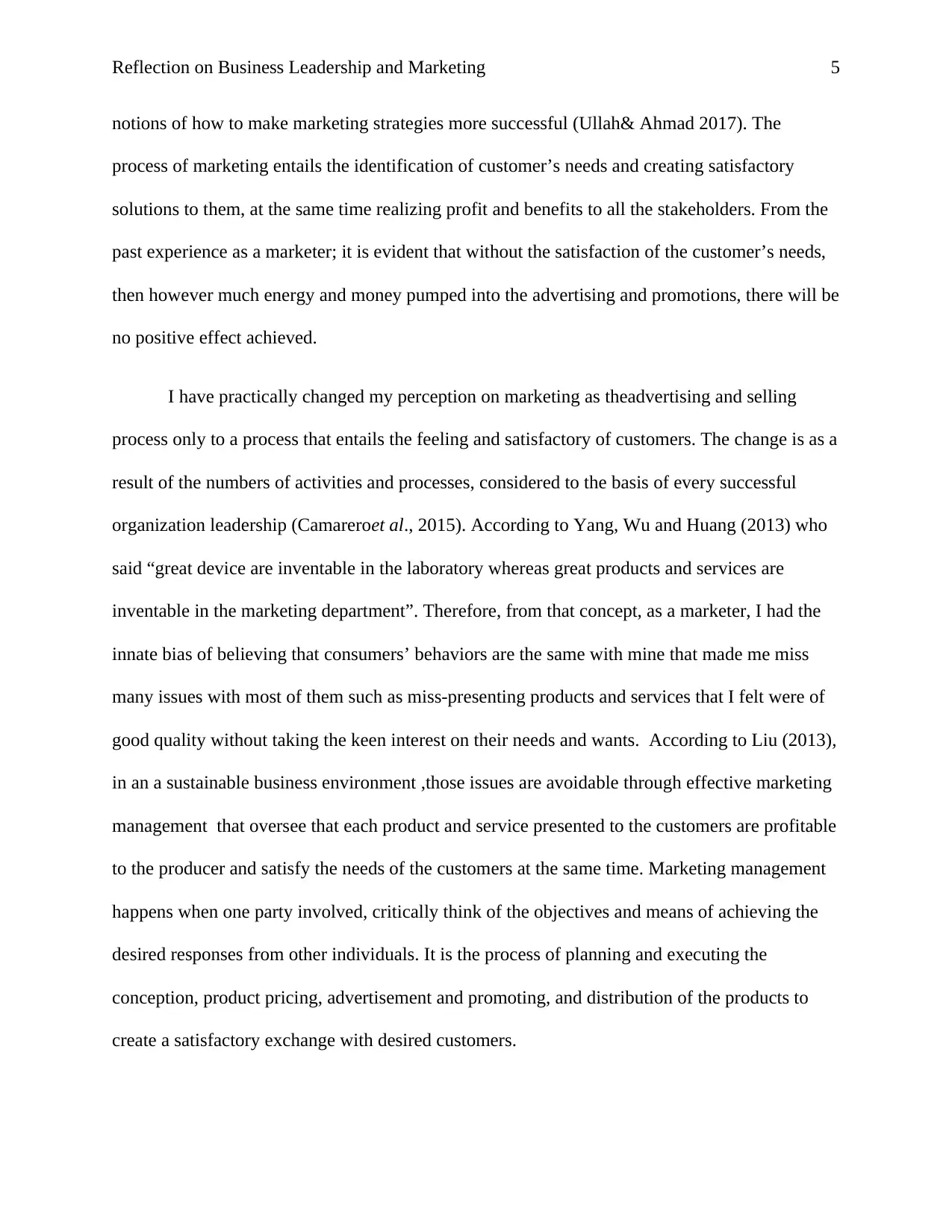
Reflection on Business Leadership and Marketing 5
notions of how to make marketing strategies more successful (Ullah& Ahmad 2017). The
process of marketing entails the identification of customer’s needs and creating satisfactory
solutions to them, at the same time realizing profit and benefits to all the stakeholders. From the
past experience as a marketer; it is evident that without the satisfaction of the customer’s needs,
then however much energy and money pumped into the advertising and promotions, there will be
no positive effect achieved.
I have practically changed my perception on marketing as theadvertising and selling
process only to a process that entails the feeling and satisfactory of customers. The change is as a
result of the numbers of activities and processes, considered to the basis of every successful
organization leadership (Camareroet al., 2015). According to Yang, Wu and Huang (2013) who
said “great device are inventable in the laboratory whereas great products and services are
inventable in the marketing department”. Therefore, from that concept, as a marketer, I had the
innate bias of believing that consumers’ behaviors are the same with mine that made me miss
many issues with most of them such as miss-presenting products and services that I felt were of
good quality without taking the keen interest on their needs and wants. According to Liu (2013),
in an a sustainable business environment ,those issues are avoidable through effective marketing
management that oversee that each product and service presented to the customers are profitable
to the producer and satisfy the needs of the customers at the same time. Marketing management
happens when one party involved, critically think of the objectives and means of achieving the
desired responses from other individuals. It is the process of planning and executing the
conception, product pricing, advertisement and promoting, and distribution of the products to
create a satisfactory exchange with desired customers.
notions of how to make marketing strategies more successful (Ullah& Ahmad 2017). The
process of marketing entails the identification of customer’s needs and creating satisfactory
solutions to them, at the same time realizing profit and benefits to all the stakeholders. From the
past experience as a marketer; it is evident that without the satisfaction of the customer’s needs,
then however much energy and money pumped into the advertising and promotions, there will be
no positive effect achieved.
I have practically changed my perception on marketing as theadvertising and selling
process only to a process that entails the feeling and satisfactory of customers. The change is as a
result of the numbers of activities and processes, considered to the basis of every successful
organization leadership (Camareroet al., 2015). According to Yang, Wu and Huang (2013) who
said “great device are inventable in the laboratory whereas great products and services are
inventable in the marketing department”. Therefore, from that concept, as a marketer, I had the
innate bias of believing that consumers’ behaviors are the same with mine that made me miss
many issues with most of them such as miss-presenting products and services that I felt were of
good quality without taking the keen interest on their needs and wants. According to Liu (2013),
in an a sustainable business environment ,those issues are avoidable through effective marketing
management that oversee that each product and service presented to the customers are profitable
to the producer and satisfy the needs of the customers at the same time. Marketing management
happens when one party involved, critically think of the objectives and means of achieving the
desired responses from other individuals. It is the process of planning and executing the
conception, product pricing, advertisement and promoting, and distribution of the products to
create a satisfactory exchange with desired customers.
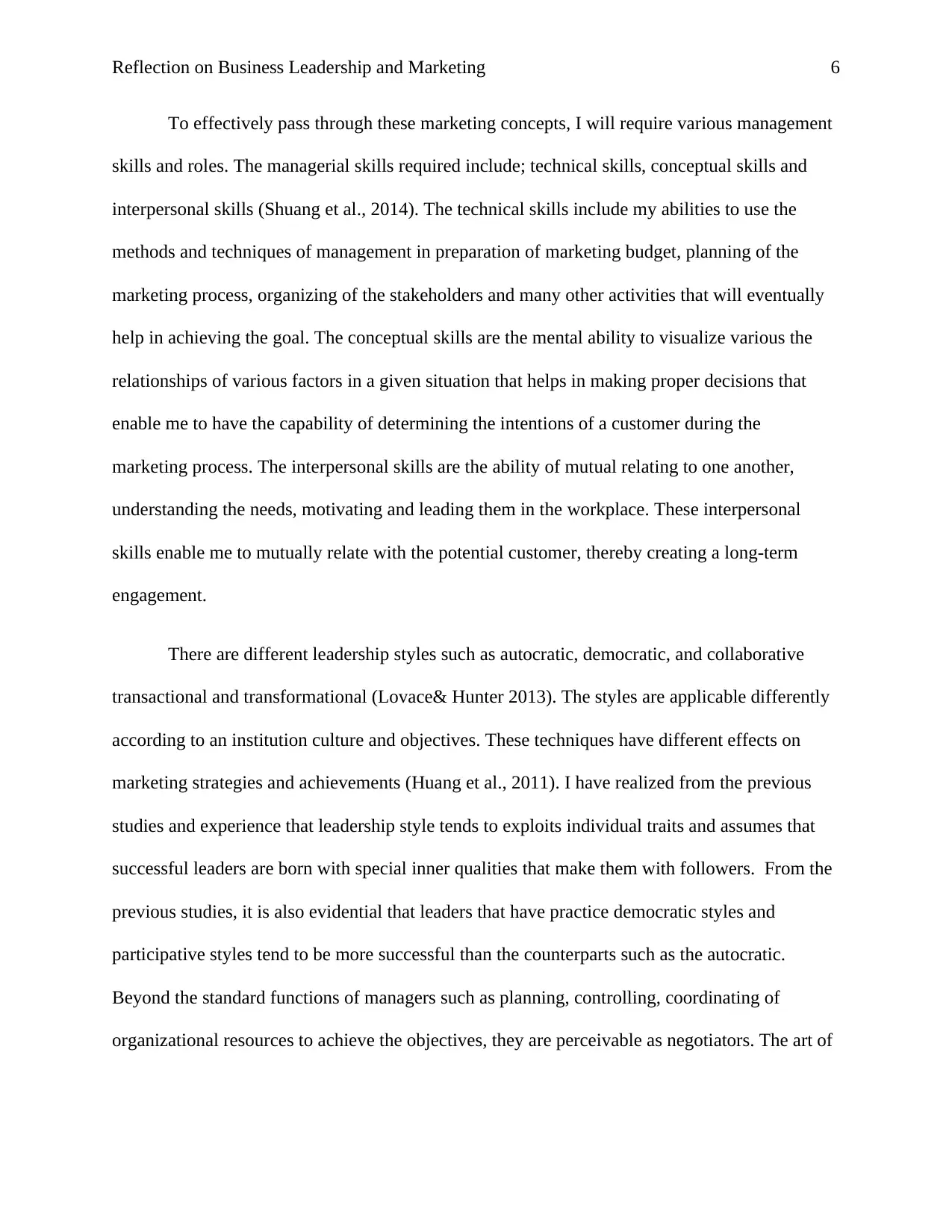
Reflection on Business Leadership and Marketing 6
To effectively pass through these marketing concepts, I will require various management
skills and roles. The managerial skills required include; technical skills, conceptual skills and
interpersonal skills (Shuang et al., 2014). The technical skills include my abilities to use the
methods and techniques of management in preparation of marketing budget, planning of the
marketing process, organizing of the stakeholders and many other activities that will eventually
help in achieving the goal. The conceptual skills are the mental ability to visualize various the
relationships of various factors in a given situation that helps in making proper decisions that
enable me to have the capability of determining the intentions of a customer during the
marketing process. The interpersonal skills are the ability of mutual relating to one another,
understanding the needs, motivating and leading them in the workplace. These interpersonal
skills enable me to mutually relate with the potential customer, thereby creating a long-term
engagement.
There are different leadership styles such as autocratic, democratic, and collaborative
transactional and transformational (Lovace& Hunter 2013). The styles are applicable differently
according to an institution culture and objectives. These techniques have different effects on
marketing strategies and achievements (Huang et al., 2011). I have realized from the previous
studies and experience that leadership style tends to exploits individual traits and assumes that
successful leaders are born with special inner qualities that make them with followers. From the
previous studies, it is also evidential that leaders that have practice democratic styles and
participative styles tend to be more successful than the counterparts such as the autocratic.
Beyond the standard functions of managers such as planning, controlling, coordinating of
organizational resources to achieve the objectives, they are perceivable as negotiators. The art of
To effectively pass through these marketing concepts, I will require various management
skills and roles. The managerial skills required include; technical skills, conceptual skills and
interpersonal skills (Shuang et al., 2014). The technical skills include my abilities to use the
methods and techniques of management in preparation of marketing budget, planning of the
marketing process, organizing of the stakeholders and many other activities that will eventually
help in achieving the goal. The conceptual skills are the mental ability to visualize various the
relationships of various factors in a given situation that helps in making proper decisions that
enable me to have the capability of determining the intentions of a customer during the
marketing process. The interpersonal skills are the ability of mutual relating to one another,
understanding the needs, motivating and leading them in the workplace. These interpersonal
skills enable me to mutually relate with the potential customer, thereby creating a long-term
engagement.
There are different leadership styles such as autocratic, democratic, and collaborative
transactional and transformational (Lovace& Hunter 2013). The styles are applicable differently
according to an institution culture and objectives. These techniques have different effects on
marketing strategies and achievements (Huang et al., 2011). I have realized from the previous
studies and experience that leadership style tends to exploits individual traits and assumes that
successful leaders are born with special inner qualities that make them with followers. From the
previous studies, it is also evidential that leaders that have practice democratic styles and
participative styles tend to be more successful than the counterparts such as the autocratic.
Beyond the standard functions of managers such as planning, controlling, coordinating of
organizational resources to achieve the objectives, they are perceivable as negotiators. The art of
⊘ This is a preview!⊘
Do you want full access?
Subscribe today to unlock all pages.

Trusted by 1+ million students worldwide
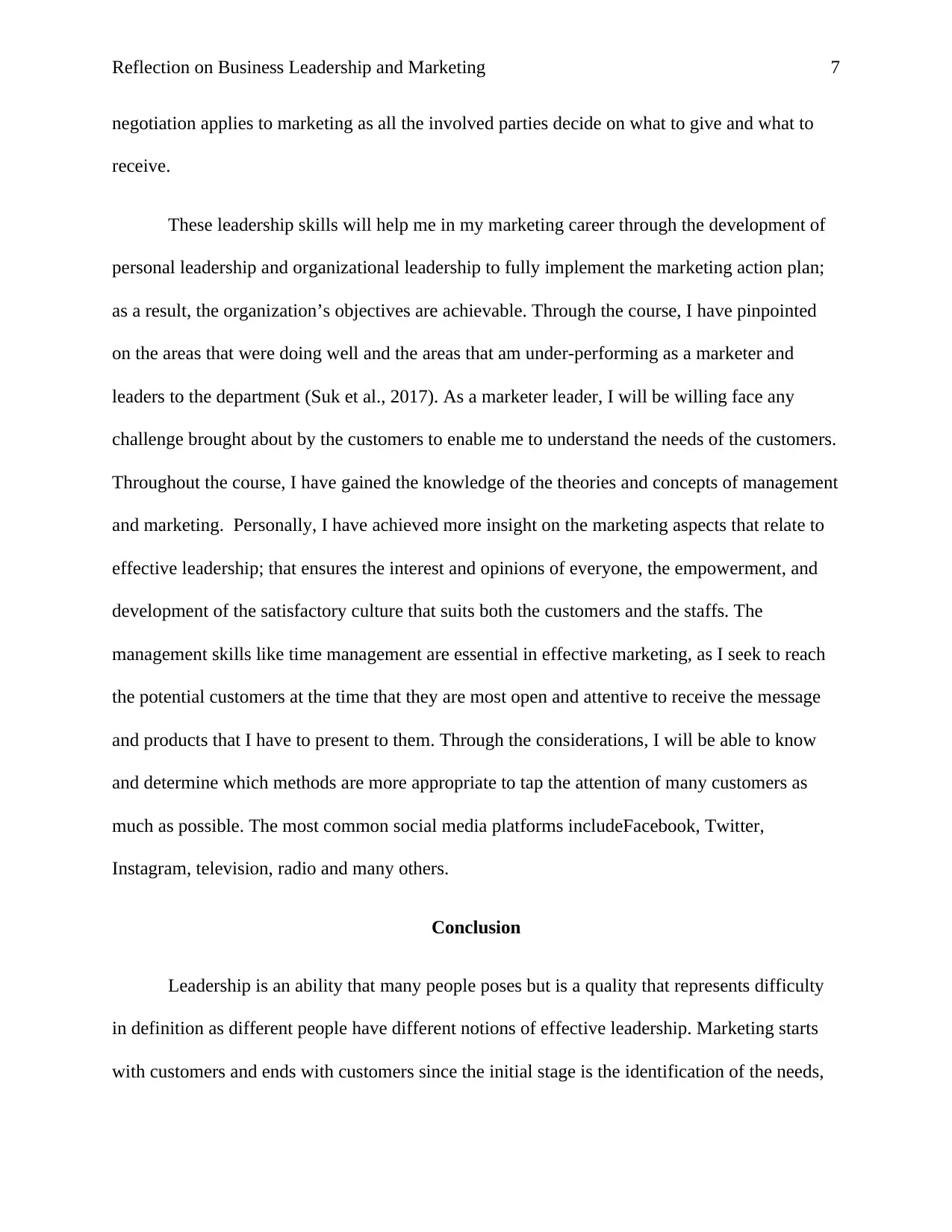
Reflection on Business Leadership and Marketing 7
negotiation applies to marketing as all the involved parties decide on what to give and what to
receive.
These leadership skills will help me in my marketing career through the development of
personal leadership and organizational leadership to fully implement the marketing action plan;
as a result, the organization’s objectives are achievable. Through the course, I have pinpointed
on the areas that were doing well and the areas that am under-performing as a marketer and
leaders to the department (Suk et al., 2017). As a marketer leader, I will be willing face any
challenge brought about by the customers to enable me to understand the needs of the customers.
Throughout the course, I have gained the knowledge of the theories and concepts of management
and marketing. Personally, I have achieved more insight on the marketing aspects that relate to
effective leadership; that ensures the interest and opinions of everyone, the empowerment, and
development of the satisfactory culture that suits both the customers and the staffs. The
management skills like time management are essential in effective marketing, as I seek to reach
the potential customers at the time that they are most open and attentive to receive the message
and products that I have to present to them. Through the considerations, I will be able to know
and determine which methods are more appropriate to tap the attention of many customers as
much as possible. The most common social media platforms includeFacebook, Twitter,
Instagram, television, radio and many others.
Conclusion
Leadership is an ability that many people poses but is a quality that represents difficulty
in definition as different people have different notions of effective leadership. Marketing starts
with customers and ends with customers since the initial stage is the identification of the needs,
negotiation applies to marketing as all the involved parties decide on what to give and what to
receive.
These leadership skills will help me in my marketing career through the development of
personal leadership and organizational leadership to fully implement the marketing action plan;
as a result, the organization’s objectives are achievable. Through the course, I have pinpointed
on the areas that were doing well and the areas that am under-performing as a marketer and
leaders to the department (Suk et al., 2017). As a marketer leader, I will be willing face any
challenge brought about by the customers to enable me to understand the needs of the customers.
Throughout the course, I have gained the knowledge of the theories and concepts of management
and marketing. Personally, I have achieved more insight on the marketing aspects that relate to
effective leadership; that ensures the interest and opinions of everyone, the empowerment, and
development of the satisfactory culture that suits both the customers and the staffs. The
management skills like time management are essential in effective marketing, as I seek to reach
the potential customers at the time that they are most open and attentive to receive the message
and products that I have to present to them. Through the considerations, I will be able to know
and determine which methods are more appropriate to tap the attention of many customers as
much as possible. The most common social media platforms includeFacebook, Twitter,
Instagram, television, radio and many others.
Conclusion
Leadership is an ability that many people poses but is a quality that represents difficulty
in definition as different people have different notions of effective leadership. Marketing starts
with customers and ends with customers since the initial stage is the identification of the needs,
Paraphrase This Document
Need a fresh take? Get an instant paraphrase of this document with our AI Paraphraser
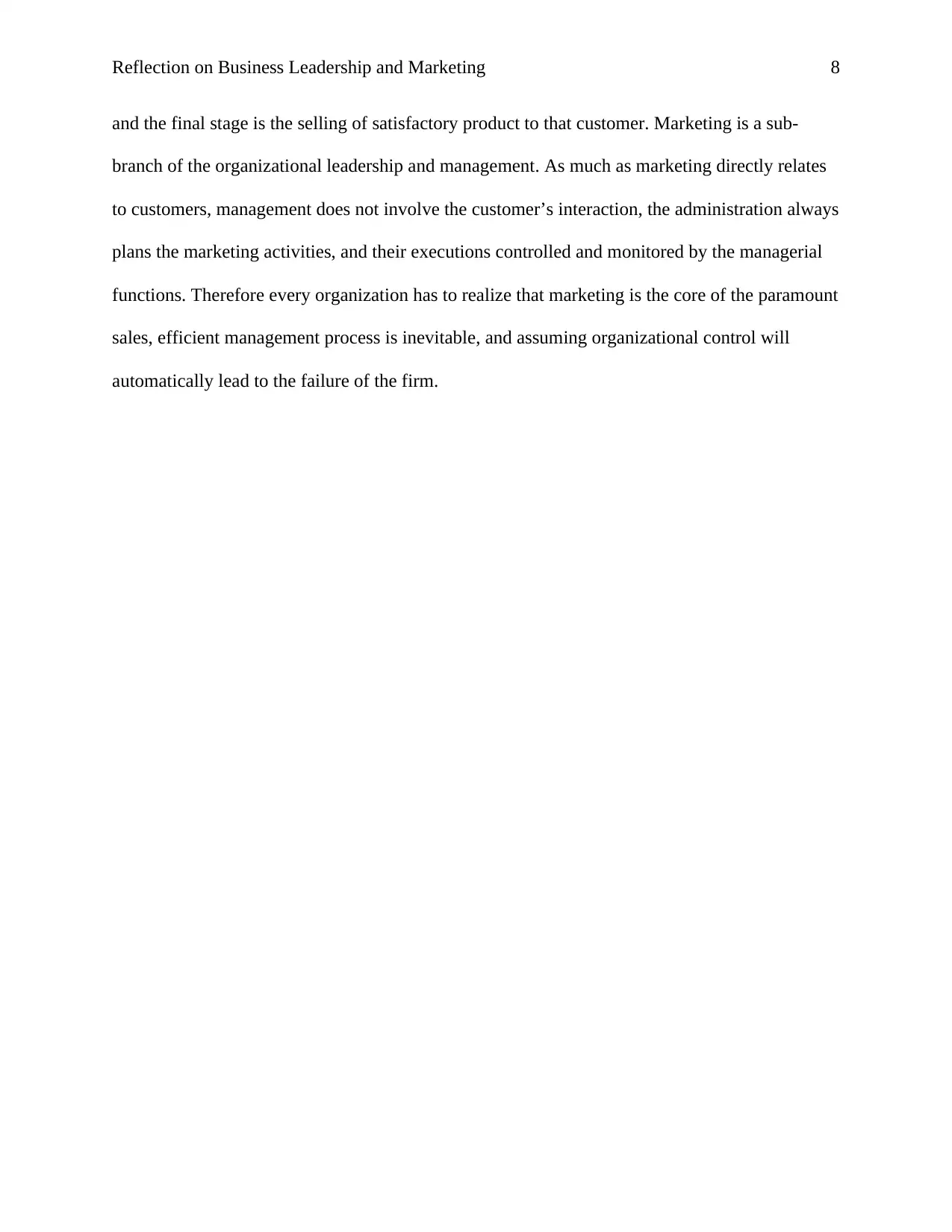
Reflection on Business Leadership and Marketing 8
and the final stage is the selling of satisfactory product to that customer. Marketing is a sub-
branch of the organizational leadership and management. As much as marketing directly relates
to customers, management does not involve the customer’s interaction, the administration always
plans the marketing activities, and their executions controlled and monitored by the managerial
functions. Therefore every organization has to realize that marketing is the core of the paramount
sales, efficient management process is inevitable, and assuming organizational control will
automatically lead to the failure of the firm.
and the final stage is the selling of satisfactory product to that customer. Marketing is a sub-
branch of the organizational leadership and management. As much as marketing directly relates
to customers, management does not involve the customer’s interaction, the administration always
plans the marketing activities, and their executions controlled and monitored by the managerial
functions. Therefore every organization has to realize that marketing is the core of the paramount
sales, efficient management process is inevitable, and assuming organizational control will
automatically lead to the failure of the firm.
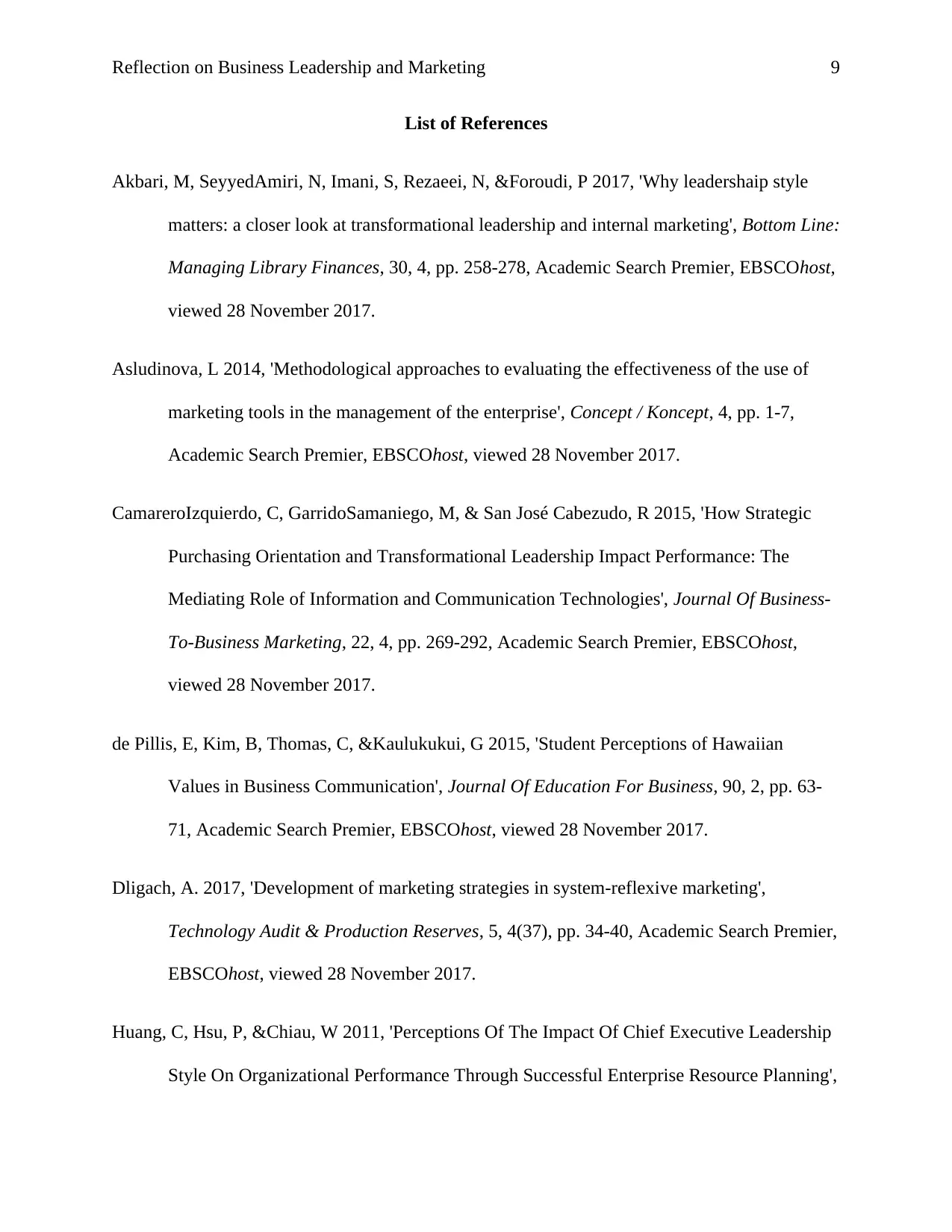
Reflection on Business Leadership and Marketing 9
List of References
Akbari, M, SeyyedAmiri, N, Imani, S, Rezaeei, N, &Foroudi, P 2017, 'Why leadershaip style
matters: a closer look at transformational leadership and internal marketing', Bottom Line:
Managing Library Finances, 30, 4, pp. 258-278, Academic Search Premier, EBSCOhost,
viewed 28 November 2017.
Asludinova, L 2014, 'Methodological approaches to evaluating the effectiveness of the use of
marketing tools in the management of the enterprise', Concept / Koncept, 4, pp. 1-7,
Academic Search Premier, EBSCOhost, viewed 28 November 2017.
CamareroIzquierdo, C, GarridoSamaniego, M, & San José Cabezudo, R 2015, 'How Strategic
Purchasing Orientation and Transformational Leadership Impact Performance: The
Mediating Role of Information and Communication Technologies', Journal Of Business-
To-Business Marketing, 22, 4, pp. 269-292, Academic Search Premier, EBSCOhost,
viewed 28 November 2017.
de Pillis, E, Kim, B, Thomas, C, &Kaulukukui, G 2015, 'Student Perceptions of Hawaiian
Values in Business Communication', Journal Of Education For Business, 90, 2, pp. 63-
71, Academic Search Premier, EBSCOhost, viewed 28 November 2017.
Dligach, A. 2017, 'Development of marketing strategies in system-reflexive marketing',
Technology Audit & Production Reserves, 5, 4(37), pp. 34-40, Academic Search Premier,
EBSCOhost, viewed 28 November 2017.
Huang, C, Hsu, P, &Chiau, W 2011, 'Perceptions Of The Impact Of Chief Executive Leadership
Style On Organizational Performance Through Successful Enterprise Resource Planning',
List of References
Akbari, M, SeyyedAmiri, N, Imani, S, Rezaeei, N, &Foroudi, P 2017, 'Why leadershaip style
matters: a closer look at transformational leadership and internal marketing', Bottom Line:
Managing Library Finances, 30, 4, pp. 258-278, Academic Search Premier, EBSCOhost,
viewed 28 November 2017.
Asludinova, L 2014, 'Methodological approaches to evaluating the effectiveness of the use of
marketing tools in the management of the enterprise', Concept / Koncept, 4, pp. 1-7,
Academic Search Premier, EBSCOhost, viewed 28 November 2017.
CamareroIzquierdo, C, GarridoSamaniego, M, & San José Cabezudo, R 2015, 'How Strategic
Purchasing Orientation and Transformational Leadership Impact Performance: The
Mediating Role of Information and Communication Technologies', Journal Of Business-
To-Business Marketing, 22, 4, pp. 269-292, Academic Search Premier, EBSCOhost,
viewed 28 November 2017.
de Pillis, E, Kim, B, Thomas, C, &Kaulukukui, G 2015, 'Student Perceptions of Hawaiian
Values in Business Communication', Journal Of Education For Business, 90, 2, pp. 63-
71, Academic Search Premier, EBSCOhost, viewed 28 November 2017.
Dligach, A. 2017, 'Development of marketing strategies in system-reflexive marketing',
Technology Audit & Production Reserves, 5, 4(37), pp. 34-40, Academic Search Premier,
EBSCOhost, viewed 28 November 2017.
Huang, C, Hsu, P, &Chiau, W 2011, 'Perceptions Of The Impact Of Chief Executive Leadership
Style On Organizational Performance Through Successful Enterprise Resource Planning',
⊘ This is a preview!⊘
Do you want full access?
Subscribe today to unlock all pages.

Trusted by 1+ million students worldwide
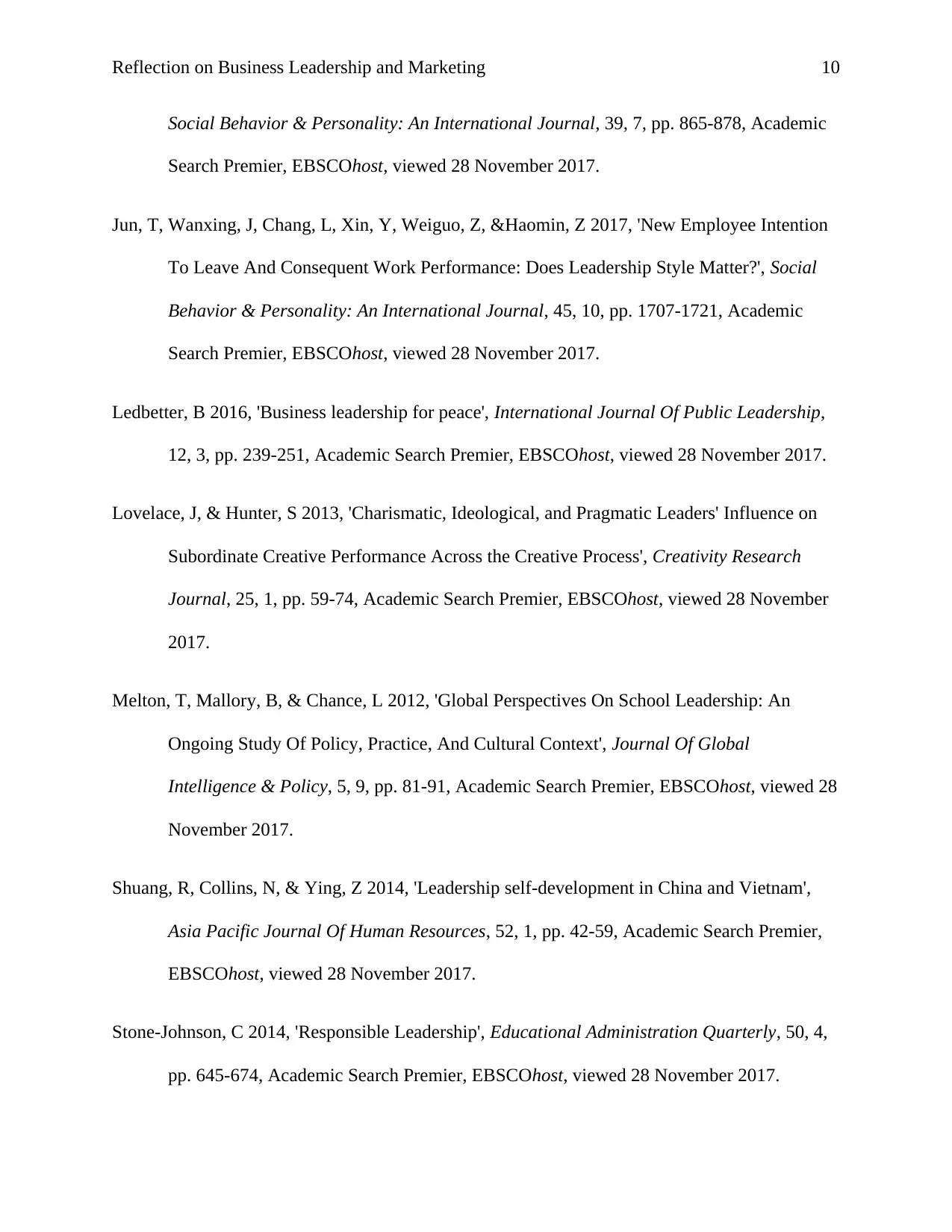
Reflection on Business Leadership and Marketing 10
Social Behavior & Personality: An International Journal, 39, 7, pp. 865-878, Academic
Search Premier, EBSCOhost, viewed 28 November 2017.
Jun, T, Wanxing, J, Chang, L, Xin, Y, Weiguo, Z, &Haomin, Z 2017, 'New Employee Intention
To Leave And Consequent Work Performance: Does Leadership Style Matter?', Social
Behavior & Personality: An International Journal, 45, 10, pp. 1707-1721, Academic
Search Premier, EBSCOhost, viewed 28 November 2017.
Ledbetter, B 2016, 'Business leadership for peace', International Journal Of Public Leadership,
12, 3, pp. 239-251, Academic Search Premier, EBSCOhost, viewed 28 November 2017.
Lovelace, J, & Hunter, S 2013, 'Charismatic, Ideological, and Pragmatic Leaders' Influence on
Subordinate Creative Performance Across the Creative Process', Creativity Research
Journal, 25, 1, pp. 59-74, Academic Search Premier, EBSCOhost, viewed 28 November
2017.
Melton, T, Mallory, B, & Chance, L 2012, 'Global Perspectives On School Leadership: An
Ongoing Study Of Policy, Practice, And Cultural Context', Journal Of Global
Intelligence & Policy, 5, 9, pp. 81-91, Academic Search Premier, EBSCOhost, viewed 28
November 2017.
Shuang, R, Collins, N, & Ying, Z 2014, 'Leadership self-development in China and Vietnam',
Asia Pacific Journal Of Human Resources, 52, 1, pp. 42-59, Academic Search Premier,
EBSCOhost, viewed 28 November 2017.
Stone-Johnson, C 2014, 'Responsible Leadership', Educational Administration Quarterly, 50, 4,
pp. 645-674, Academic Search Premier, EBSCOhost, viewed 28 November 2017.
Social Behavior & Personality: An International Journal, 39, 7, pp. 865-878, Academic
Search Premier, EBSCOhost, viewed 28 November 2017.
Jun, T, Wanxing, J, Chang, L, Xin, Y, Weiguo, Z, &Haomin, Z 2017, 'New Employee Intention
To Leave And Consequent Work Performance: Does Leadership Style Matter?', Social
Behavior & Personality: An International Journal, 45, 10, pp. 1707-1721, Academic
Search Premier, EBSCOhost, viewed 28 November 2017.
Ledbetter, B 2016, 'Business leadership for peace', International Journal Of Public Leadership,
12, 3, pp. 239-251, Academic Search Premier, EBSCOhost, viewed 28 November 2017.
Lovelace, J, & Hunter, S 2013, 'Charismatic, Ideological, and Pragmatic Leaders' Influence on
Subordinate Creative Performance Across the Creative Process', Creativity Research
Journal, 25, 1, pp. 59-74, Academic Search Premier, EBSCOhost, viewed 28 November
2017.
Melton, T, Mallory, B, & Chance, L 2012, 'Global Perspectives On School Leadership: An
Ongoing Study Of Policy, Practice, And Cultural Context', Journal Of Global
Intelligence & Policy, 5, 9, pp. 81-91, Academic Search Premier, EBSCOhost, viewed 28
November 2017.
Shuang, R, Collins, N, & Ying, Z 2014, 'Leadership self-development in China and Vietnam',
Asia Pacific Journal Of Human Resources, 52, 1, pp. 42-59, Academic Search Premier,
EBSCOhost, viewed 28 November 2017.
Stone-Johnson, C 2014, 'Responsible Leadership', Educational Administration Quarterly, 50, 4,
pp. 645-674, Academic Search Premier, EBSCOhost, viewed 28 November 2017.
Paraphrase This Document
Need a fresh take? Get an instant paraphrase of this document with our AI Paraphraser
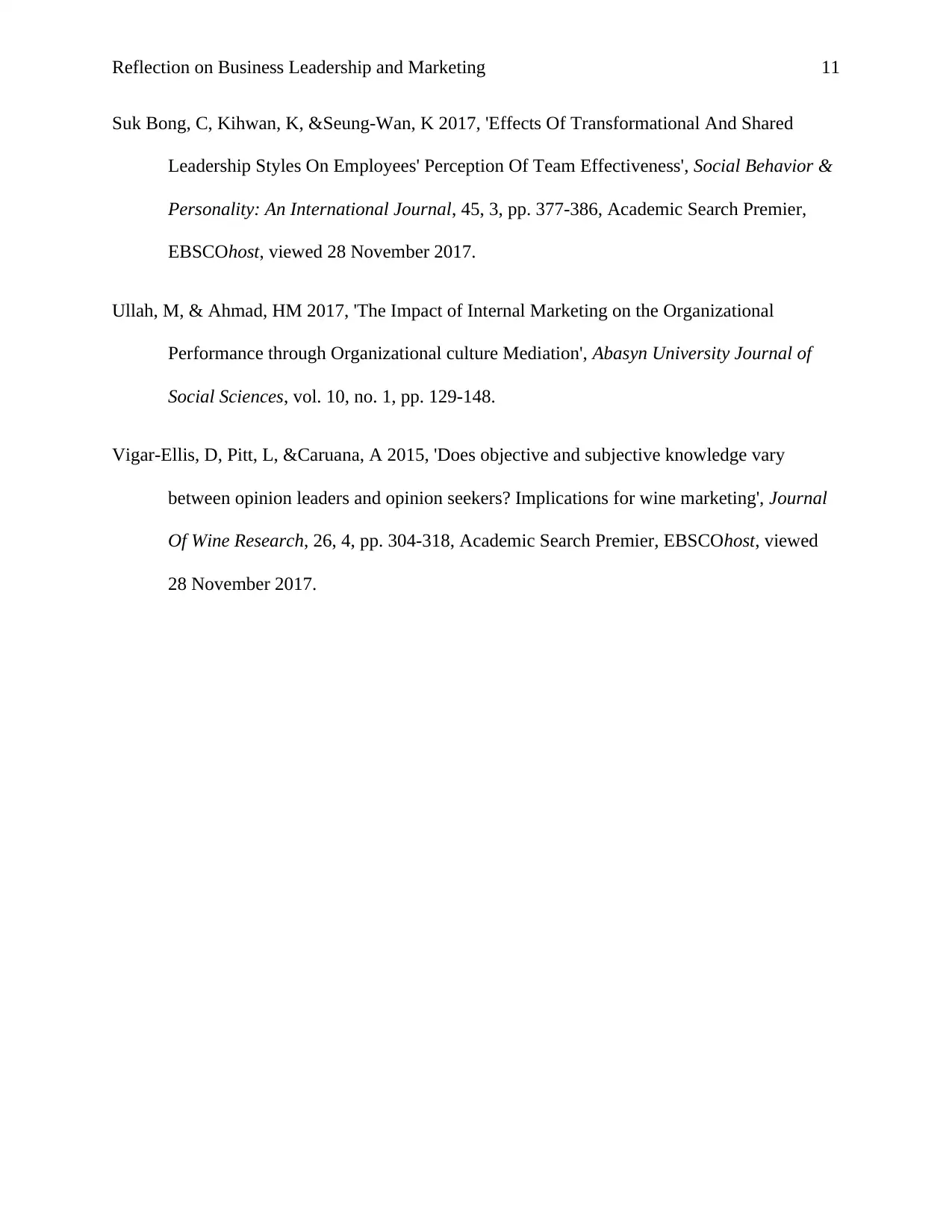
Reflection on Business Leadership and Marketing 11
Suk Bong, C, Kihwan, K, &Seung-Wan, K 2017, 'Effects Of Transformational And Shared
Leadership Styles On Employees' Perception Of Team Effectiveness', Social Behavior &
Personality: An International Journal, 45, 3, pp. 377-386, Academic Search Premier,
EBSCOhost, viewed 28 November 2017.
Ullah, M, & Ahmad, HM 2017, 'The Impact of Internal Marketing on the Organizational
Performance through Organizational culture Mediation', Abasyn University Journal of
Social Sciences, vol. 10, no. 1, pp. 129-148.
Vigar-Ellis, D, Pitt, L, &Caruana, A 2015, 'Does objective and subjective knowledge vary
between opinion leaders and opinion seekers? Implications for wine marketing', Journal
Of Wine Research, 26, 4, pp. 304-318, Academic Search Premier, EBSCOhost, viewed
28 November 2017.
Suk Bong, C, Kihwan, K, &Seung-Wan, K 2017, 'Effects Of Transformational And Shared
Leadership Styles On Employees' Perception Of Team Effectiveness', Social Behavior &
Personality: An International Journal, 45, 3, pp. 377-386, Academic Search Premier,
EBSCOhost, viewed 28 November 2017.
Ullah, M, & Ahmad, HM 2017, 'The Impact of Internal Marketing on the Organizational
Performance through Organizational culture Mediation', Abasyn University Journal of
Social Sciences, vol. 10, no. 1, pp. 129-148.
Vigar-Ellis, D, Pitt, L, &Caruana, A 2015, 'Does objective and subjective knowledge vary
between opinion leaders and opinion seekers? Implications for wine marketing', Journal
Of Wine Research, 26, 4, pp. 304-318, Academic Search Premier, EBSCOhost, viewed
28 November 2017.
1 out of 11
Related Documents
Your All-in-One AI-Powered Toolkit for Academic Success.
+13062052269
info@desklib.com
Available 24*7 on WhatsApp / Email
![[object Object]](/_next/static/media/star-bottom.7253800d.svg)
Unlock your academic potential
Copyright © 2020–2026 A2Z Services. All Rights Reserved. Developed and managed by ZUCOL.





